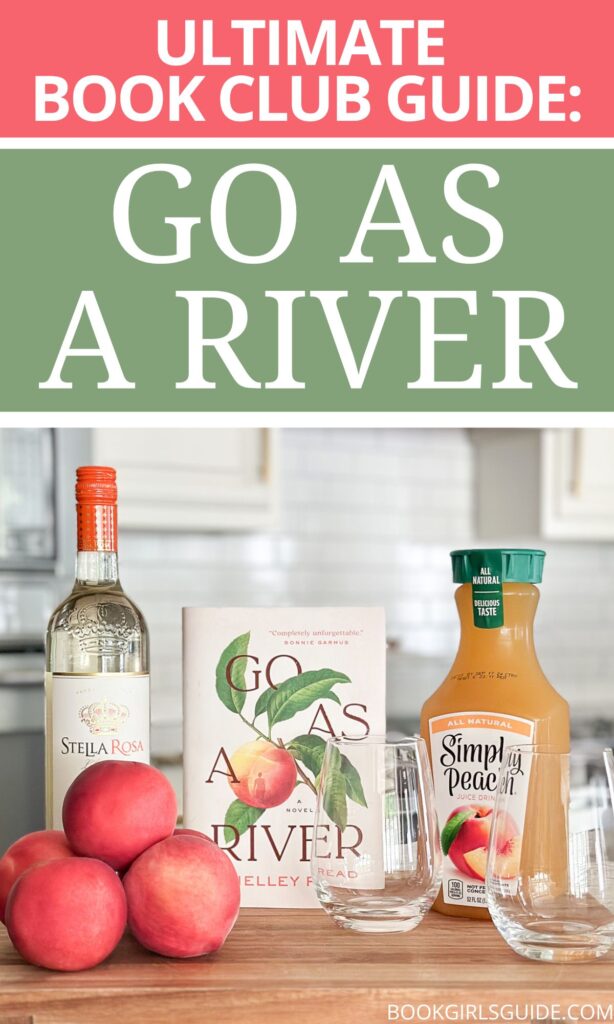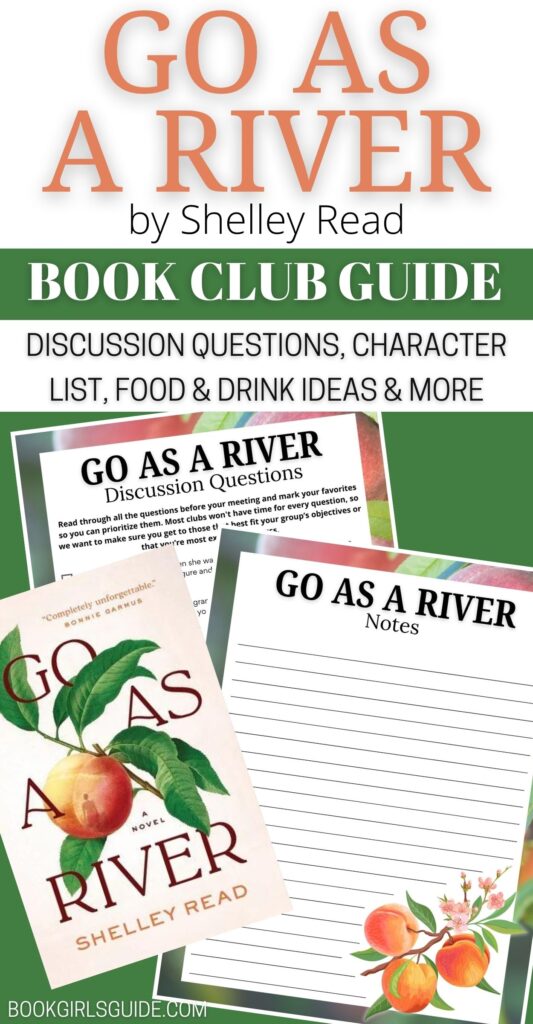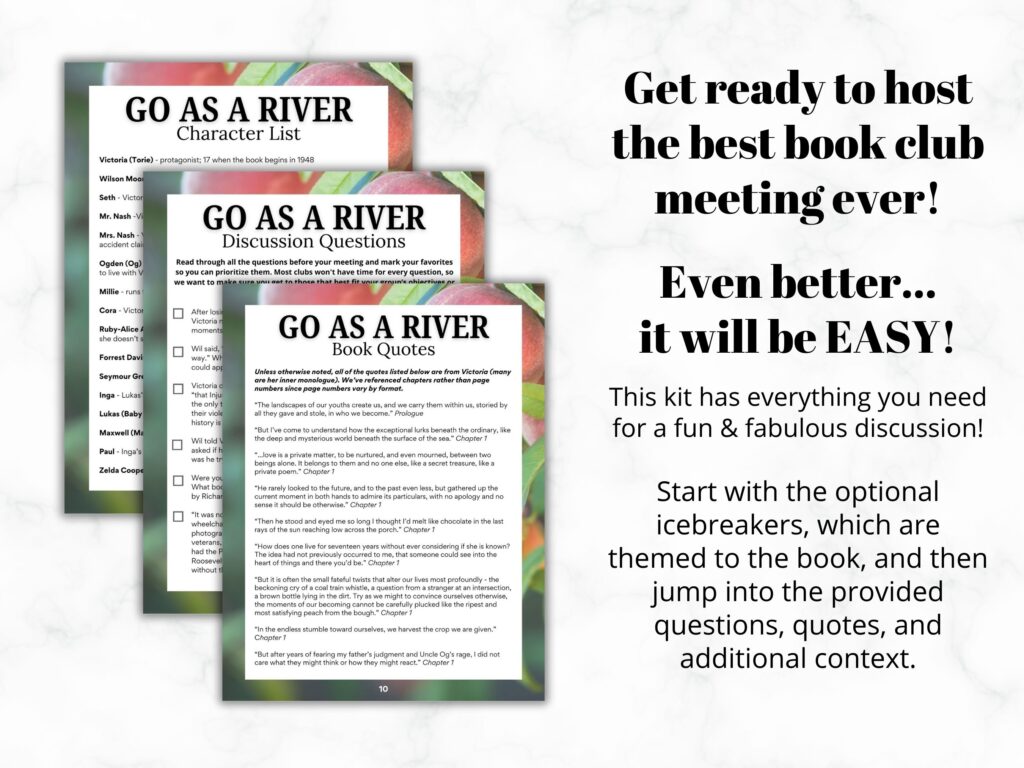Go As a River Book Club Questions & Guide
If your book club is looking for the perfect fall read that combines beautifully descriptive language with discussion-worthy themes, look no further than Go As a River by Shelley Read.
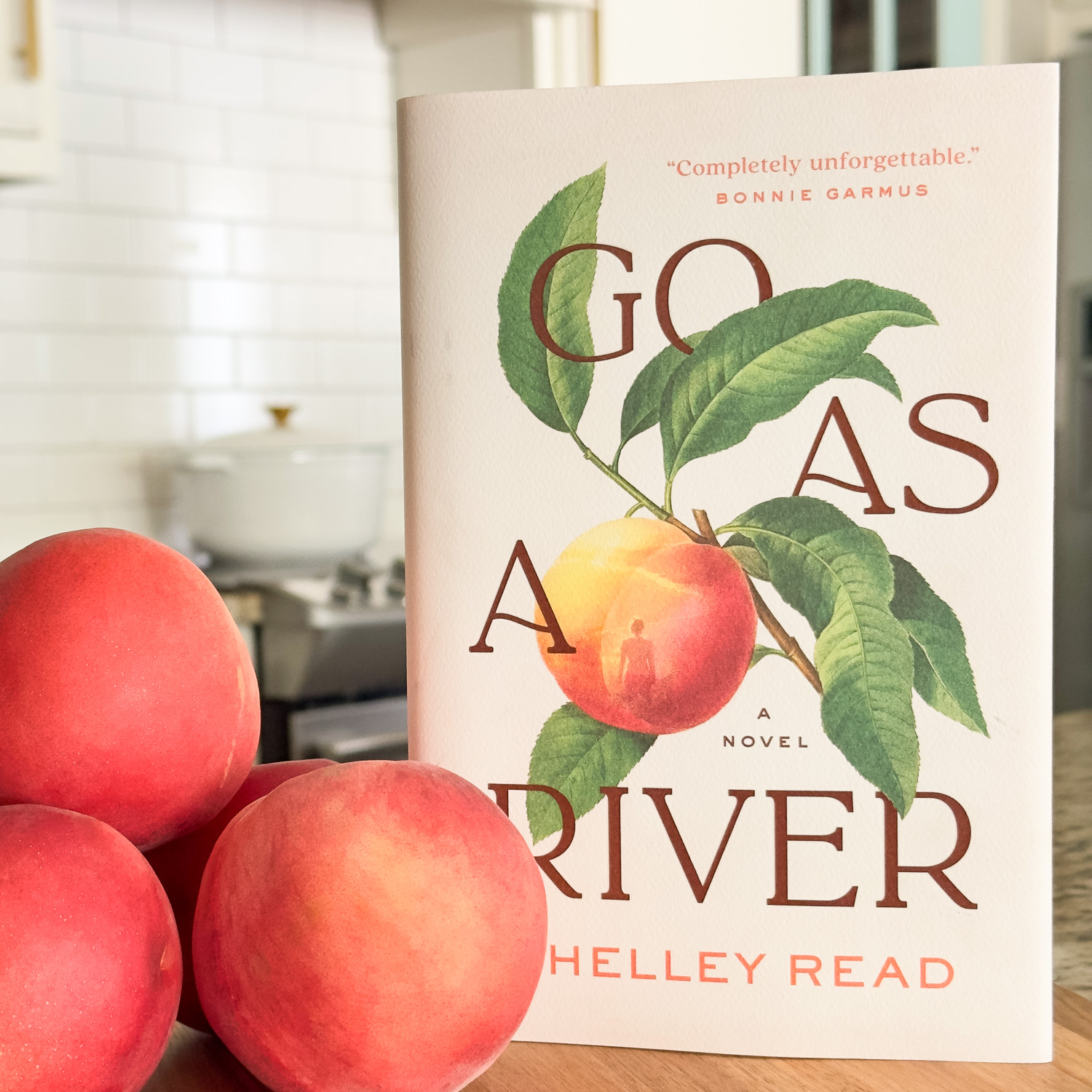
Beyond this point, this post contains spoilers, as it is intended for those who have already finished reading the book.
Book Club Discussion Guide – Online and Printable Versions
Online Version
The post below includes everything you need to host or participate in a successful book club for Go As a River. From discussion questions and a character list to food and cocktail ideas, we’ll help you put together a wonderful gathering.
Printable Version
We also have an optional printable Go As a River book club kit to take your meeting to the next level. The fully customized version of the book club guide is designed for printing and includes the following pages:
- A Character List
- Book Club Discussion Questions
- Quotes from the Book
- Icebreaker Questions Themed to the Book
- Printable Bookmarks for All Your Members
- Bonus Contextual Information about Iola, Colorado & the Blue Mesa Reservoir
- Themed Food & Drink Menu Ideas
- Custom Designed Journal Page to Record Book Club Meeting Details
- Themed Notes Page
Etsy purchases help The Book Girls continue to do what we do. However, there is no pressure to purchase; you’re always welcome to use any of the resources below for free!
Book Club Discussion Questions for Go As a River by Shelly Read
In addition to the Go As a River discussion questions below, we have a resource of 50 book club questions that work for any book. That post also provides tips for creating your own book club questions.
Read through all the questions before your meeting and select your favorites so you can prioritize them. Most clubs won’t have time for every question, so we want to make sure you get to those that best fit your group’s objectives or that you’re most excited to discuss.
- After losing her mother when she was twelve, there are several points when Victoria needed a mother figure and didn’t have one. Which of these moments stood out to you?
- Wil said, “I’ll go as a river. My grandfather always told me that it’s the only way.” What does this mean to you? Is there anywhere in your life where it could apply?
- Victoria did not realize that Wil was a Native American until Millie called him “that Injun boy.” Victoria says that she had never seen an Indian before and the only thing she knew about them was what she learned in school about their violence against her grandparents’ generation. Discuss how the way history is taught affects our view of others.
- Wil told Victoria he was from a place “You call Four Corners,” but when asked if he missed it, he only responded that “No land has corners.” What was he trying to tell her about his past?
- Were you aware of Indian boarding schools before reading Wil’s back story? What books do you recommend on the topic? (We recommend Indian Horse by Richard Wagamese and This Tender Land by William Kent Krueger.)
- “It was not until long after both Roosevelt and Og had passed away and wheelchairs were no longer made of wood that I saw one of only two known photographs of the President in his chair, and I wondered how many war veterans, legless and miserable like Og, might have suffered a little bit less had the President not hidden his chair in shame.” Do you agree that Franklin Roosevelt should have been a better example to men who returned from war without the use of their legs? Why or why not?
- What emotions did you feel when you discovered what happened to Wil?
- Did you agree with Victoria’s decision to quietly leave her home after she discovered what happened to Wil? Was it more dangerous for Victoria to leave or would it have been more dangerous to stay?
- As Victoria prepares to leave home, she describes packing up supplies and planning her route as if making plans for a different girl rather than for herself. Have you ever experienced a difficult situation where you felt detached from the process in order to get through it?
- Discuss the significance of Victoria using her full first name, rather than Torie (as her family called her), when signing the note to her father before leaving home. How do the names we choose and the names chosen for us affect the ways that we see ourselves?
- After leaving home, Victoria reflects on how she felt when she lost her mother, and how she feels knowing she’ll soon be a mother. She describes being unprepared for both. Discuss.
- Did Victoria make the right choice when she saw the car and family in the clearing?
- Before returning to her father’s home, Victoria spent time mentally and physically returning to “normal” under the care of Ruby-Alice. How would her arrival home have been different if she returned dirty, starving, and disheveled?
- Upon returning to the orchard in Iola, Victoria said the only apology she owed was to her father’s horse, Abel. Do you agree?
- Before leaving home, Victoria believes that her father sees her as a fixture and a simple house servant. Discuss how Victoria’s relationship with her father changes after she returns to the orchard.
- Despite hearing many negative things about Ruby-Alice over the years, Victoria changed her opinion about her neighbor. How did your impression of Ruby-Alice change throughout the story?
- Did you enjoy the perspective shift the author used when it was time to introduce us to Inga?
- Both Victoria and Lukas had complicated relationships with their brothers. Compare and contrast how the siblings helped and hurt each other.
- Inga almost told Lukas about his real origin when he was 12, but then she worried that his real mother might want him back. However, she was willing to share her secret to keep him safe from Vietnam. Do you agree with her timing?
- Victoria was the first to sell her land to the government for the dam project. Did you agree with her decision or did you agree with the townspeople who thought they all must stay united to preserve their property?
- Before the people of Iola were forced off their land, the Indigenous people native to the area were forced off the same land. Among them, Wil was forced from his home and into a residential school. Discuss the parallels and differences between the stories.
- The novel ends just as Victoria and Lukas meet for the first time. Would you read a sequel to this story? What do you think happened next in the characters’ lives?
- The author used descriptive language with a heavy focus on nature throughout the story. Could you visualize each phase of Victoria’s life? Which location would you like to be dropped into?
- What was the overriding message of Go As a River for you?
List of Characters in Go As a River
Victoria (Torie) – protagonist; 17 when the book begins in 1948
Wilson Moon (Wil) – Native American teen who has a brief romance with Victoria
Seth – Victoria’s younger brother; 16 when the book begins
Mr. Nash – Victoria’s dad; runs the family farm with a peach orchard
Mrs. Nash – Victoria’s mom; died in a car accident when Victoria was 12; the same accident claimed the lives of Victoria’s aunt Vivian and cousin Calamus
Ogden (Og) – Victoria’s uncle; uses a wheelchair due to an injury in WW2; came to live with Victoria’s family after the car accident
Millie – runs the flophouse; married to Matty Dunlap
Cora – Victoria’s neighbor who worked the Nash family fruit stand in Iola
Ruby-Alice Akers – Victoria’s older neighbor who becomes a friend even though she doesn’t speak
Forrest Davis – helps in the orchard; Seth says he’s the one who killed Wil
Seymour Greeley (Professor Greeney) – helped Victoria relocate the peach trees
Inga – Lukas’s adoptive mother who found him in her car
Lukas (Baby Blue) – Victoria & Wil’s baby, raised as a twin of Max
Maxwell (Max) – Lukas’ brother, biological son of Inga and Paul
Paul – Inga’s husband, Lukas’ adoptive father
Zelda Cooper – Victoria’s close friend; married to realtor Ed Cooper
Go As a River Book Club Menu Ideas
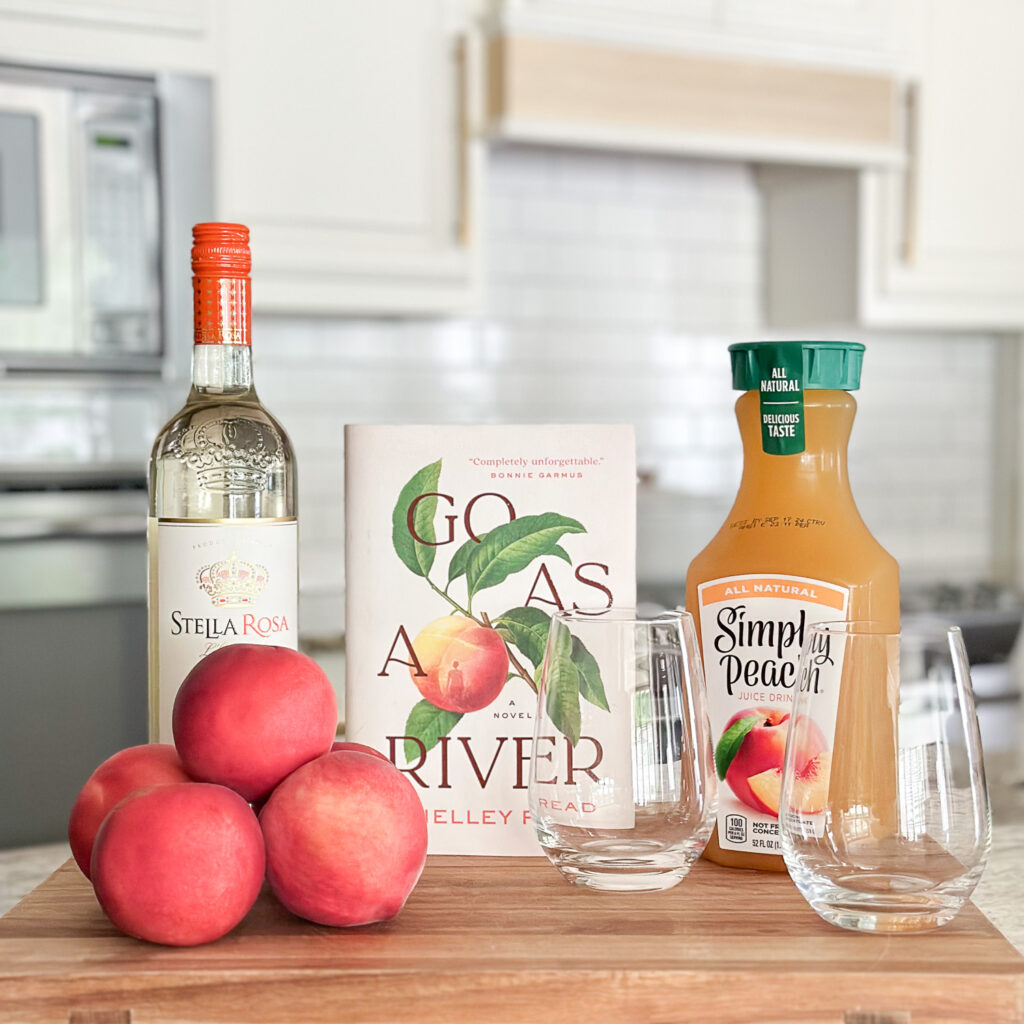
Beverages
Keep things simple by picking up Stella Peach wine from Stella Rosa Vineyards. It’s a semi-sweet crowd-pleaser with notes of white peach and honey. If your group prefers cocktails, Peach Sangria is hard to beat, but you could also make a pitcher of peach mimosas with Simply Peach juice from the refrigerated section of the grocery store mixed with sparkling wine.
For non-alcoholic options, Waterloo makes a delicious peach sparkling water that could be enjoyed alone or used to make an easy mocktail version of a mimosa instead of sparkling wine.
Appetizers
Start your meal with a delicious peach salsa or peach crostini. With the endless delicious recipes available online, you could even create a trio of different peach crostinis.
Main Course
If you serve a main course at your club, consider making a savory peach pizza, peach-glazed ham, or balsamic peach pork chops. For a lighter option, try a peach salad with arugula, basil, and goat cheese.
Dessert
It doesn’t get more classic than a peach cobbler. Try the easy dump cake version from Savory Experiments, or pick up a frozen cobbler to save time. You could also make a peach raspberry pie like Victoria served her father.
Go As a River Decor Ideas
Incorporating nature into your book club decor would be a great way to reflect the book. Additionally, we found some adorable peach items that can be ordered on Amazon to pay homage to Nash Peaches.
This table runner reminds us of the book cover!
If you want to make life easier with disposable tableware, this peachy set includes plates, napkins, cups, and even a tablecloth! Or, you can pick up peach-shaped napkins if you don’t need the full set.
Looking for a centerpiece? These small vases with faux peach tree branches would be cute around the house after a book club meeting. They are only 8 inches tall, which is great so they don’t obstruct your vision across the table.
If you have access to wildflowers like Victoria did, pick a bouquet and arrange it in a glass mason jar. Some of the flowers she mentions specifically are sunflowers, purple lupines, and pale pink wild roses.
Quotes from Go As a River
We compiled a list of our favorite quotes from Go As a River, which make great talking points as part of a book club discussion. Be sure to jot down any quotes you highlighted along the way, as well.
You can read all of the quotes below, or if you prefer a printable version, the quotes are also included in our downloadable, custom book club kit for Go As a River. The kit also includes printable bookmarks featuring a quote from the novel.
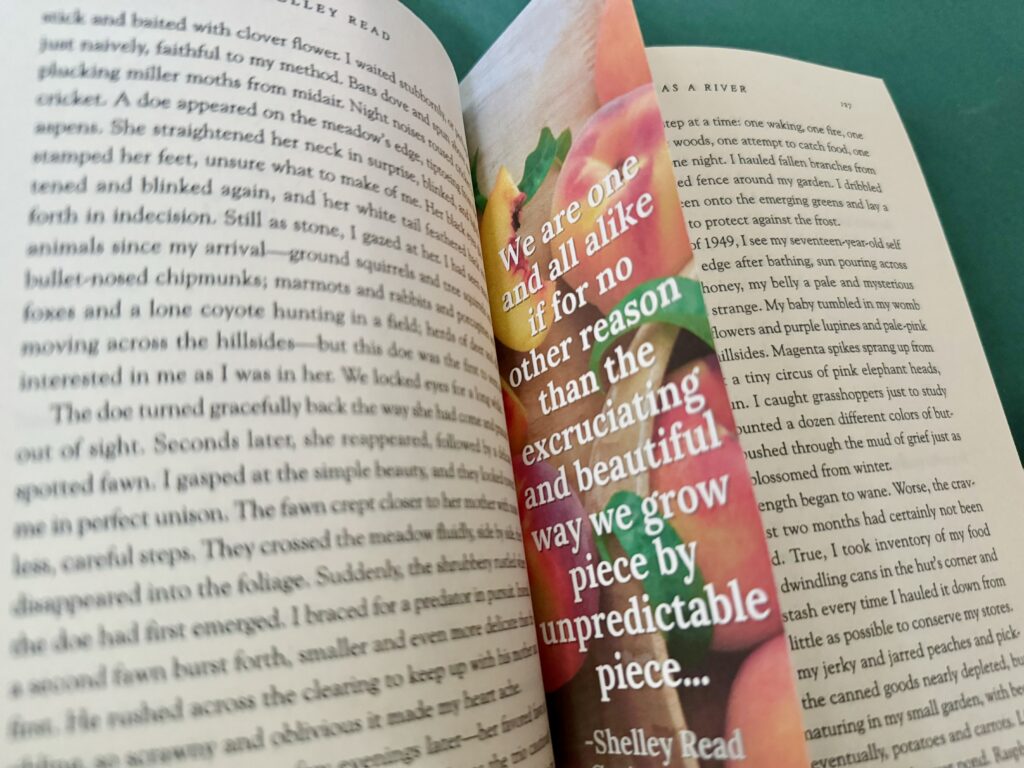
Unless otherwise noted, all of the quotes listed below are from Victoria (some are her inner monologue). We’ve referenced chapters rather than page numbers since page numbers vary by format.
“The landscapes of our youths create us, and we carry them within us, storied by all they gave and stole, in who we become.” Prologue
“But I’ve come to understand how the exceptional lurks beneath the ordinary, like the deep and mysterious world beneath the surface of the sea.” Chapter 1
“…love is a private matter, to be nurtured, and even mourned, between two beings alone. It belongs to them and no one else, like a secret treasure, like a private poem.” Chapter 1
“He rarely looked to the future, and to the past even less, but gathered up the current moment in both hands to admire its particulars, with no apology and no sense it should be otherwise.” Chapter 1
“Then he stood and eyed me so long I thought I’d melt like chocolate in the last rays of the sun reaching low across the porch.” Chapter 1
“How does one live for seventeen years without ever considering if she is known? The idea had not previously occurred to me, that someone could see into the heart of things and there you’d be.” Chapter 1
“But it is often the small fateful twists that alter our lives most profoundly – the beckoning cry of a coal train whistle, a question from a stranger at an intersection, a brown bottle lying in the dirt. Try as we might to convince ourselves otherwise, the moments of our becoming cannot be carefully plucked like the ripest and most satisfying peach from the bough.” Chapter 1
“In the endless stumble toward ourselves, we harvest the crop we are given.” Chapter 1
“But after years of fearing my father’s judgment and Uncle Og’s rage, I did not care what they might think or how they might react.” Chapter 1
“…five years later, without my cousin Calamus to do the maintenance work or Mother to dictate it, the farm had become like a burlap potato sack to its former white linen.” Chapter 2
“Like the farm, my father had withered a little bit each day, and now riding in his strong arms felt like being carried by a feeble old mule.” Chapter 2
“The war did to Ogden just what the train had done to Mr. Massey’s sleek automobile: taken something of unique beauty and promise and crushed it.” Chapter 2
“My mother had taught me the basics of domesticity, but, at only twelve years old when it became my job, I didn’t know if I was doing the chores correctly, and certainly not as well as she would have done. More than anything, I was unsure I wanted to do them at all or if I was allowed to say so.” Chapter 3
“I was a girl alone in a house of men, quickly becoming a woman.” Chapter 3
“Since the day he’d returned from war, Og’s fury was surely the lion concealing the lamb of his sorrow.” Chapter 6
“My young mind couldn’t quite comprehend that a horse who had not existed moments earlier suddenly had a body, a name, and a life… Something had been made of nothing right before our eyes.” Chapter 10
“Just a single rainstorm can erode the banks and change the course of a river, so can a single circumstance of a girl’s life erase who she was before.” Chapter 10
“It was hard to imagine my father pondering my absence, considering me, the actuality of his daughter, as more than mere fixture, simple house servant, the correct and predictable girl.” Chapter 10
“Just as I had stepped into a motherless life, I would step into the life of a mother. I would heed the call of necessity. I would rise.” Chapter 11
“I considered how some forest mothers felt their babies kick within them just as I did, how others nursed and nurtured and protected their offspring just as I would. I thought about all the life beginning, enduring, and ending around me, from the biggest bear to the tiniest insect, the seed and the bud and the blossom. Here in the forest, I was not alone.” Chapter 11
`“Delicate happiness pushed through the mud of grief just as surely as the summer forest blossomed from winter.” Chapter 12
“Like the parched landscape before the snow, my body was in drought. I had nothing left to give.” Chapter 13
“Sorrow tried but did not claim me.” Chapter 14
“Wil had a home he never found his way back to, where he knew the land and the land knew him, where, perhaps, his family waited for him still.” Chapter 16
“I thought of how this place also held the cruelty of ignorance, where some folks believed a lonely old woman was a devil and a beautiful tan-skinned boy was an outlaw and a skunk. The same misconceived ire was aimed at me now, and no amount of nostalgia made me want to stay.” Chapter 17
“I mean, the only reason we’re sitting here right now is they got forced off all this land we call our own. Just because people ignore that fact doesn’t make it any less true.” -Zelda, Chapter 19
“Sometimes a woman splits in two. Sometimes a woman is a public self who sits rigid on a bench with proper dignity and acceptance as someone she deeply loves walks away, while simultaneously her private self is shrieking and chasing and grasping and tackling and begging that love to stay.” -Inga, Chapter 21
“Women endure. That’s what we do.” Chapter 23
“A woman is more than a vessel meant to carry babies and grief.” -Zelda, Chapter 23
“We are one and all alike if for no other reason than the excruciating and beautiful way we grow piece by unpredictable piece, falling, pushing from debris, rising again, and hoping for the best.” Chapter 23
“I decided then that this was what I would … tell my son if I was ever fortunate enough to know him: that I had lived my life willing to face what came to me, and that I’d always tried to do the next right thing.” Chapter 23
FAQs
Can I get a printable version of the book club guide?
Yes! We have a printable version of this guide in our shop that includes bonus goodies, like icebreaker activities, printable bookmarks, and bonus context for further discussion.
Is there a Go As a River audiobook?
Yes! The audiobook is narrated by Cynthia Farrell Webber.
Audible listeners rate the audiobook performance 4.3 out of 5 stars. Of course, as with all audiobooks, some people enjoy the narration, and others don’t. We always recommend listening to a sample of the audiobook before committing to reading in this format.
Will there be a Go As a River movie?
In 2023, the film rights were sold to content producers Fifth Season and Mazur Kaplan for a film adaptation. As of August 2024, no further information is available.
Are there other books like Go As a River?
Yes! Reading the descriptions of the land in Go As a River reminded us of Where the Crawdads Sing. If you loved that aspect of the book, we recommend checking out the 20+ titles on our list of Books Like Where the Crawdads Sing.
If you enjoyed the rural aspects of Iola, combined with a strong female character, we recommend The Book Woman of Troublesome Creek.
About Shelley Read
Author Shelley Read is a fifth-generation Coloradan and lives with her family in the Elk Mountains of the Western Slope. As a child, she knew about the towns at the bottom of the Blue Mesa Reservoir, and they have always captured her imagination.
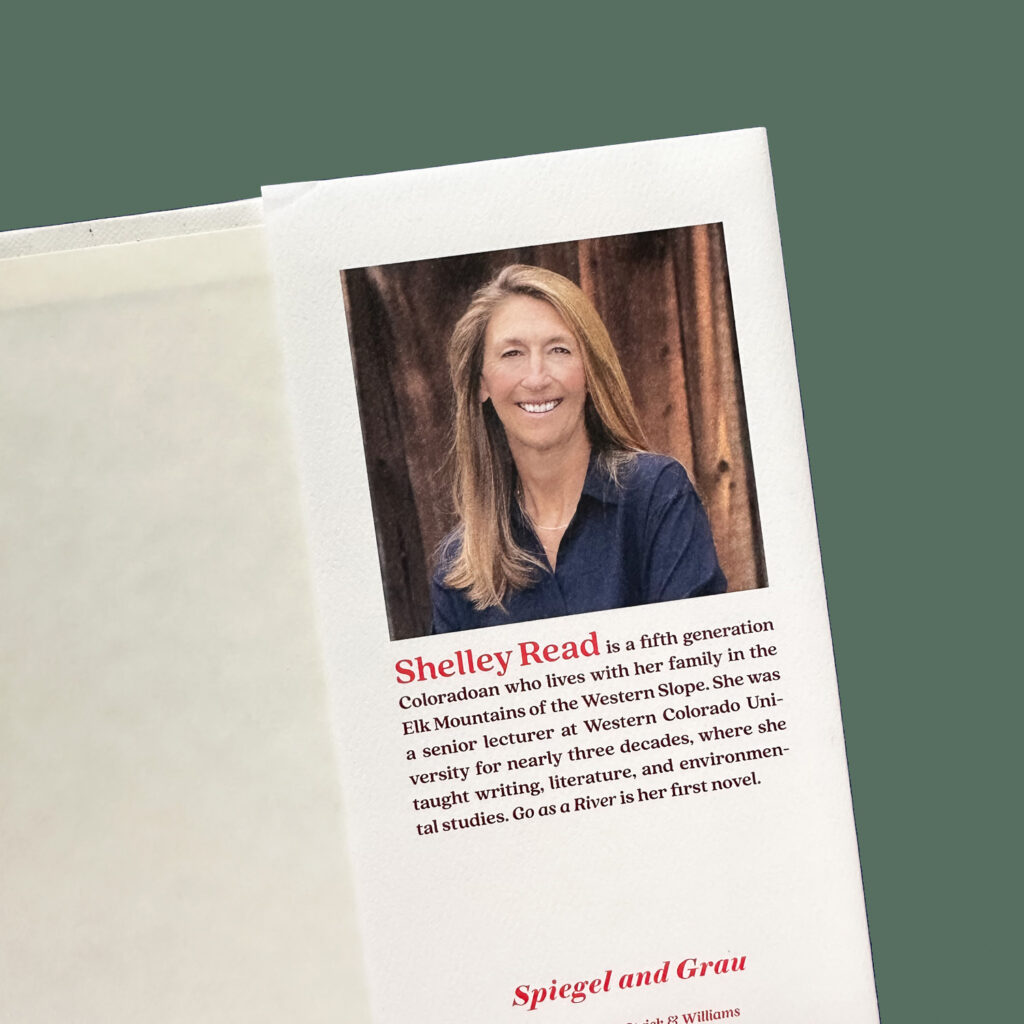
Before writing her internationally bestselling debut, Go As a River, she was a Senior Lecturer at Western Colorado University for nearly three decades, where she taught writing, literature, and environmental studies. She holds degrees in writing and literary studies from the University of Denver and Temple University’s Graduate Program in Creative Writing and was a Dean’s Fellow in the University of Denver’s PhD program in English.
We hope you found this book club guide helpful!
As a reminder, you can get the guide in a print-friendly format for your book club meeting in our Etsy shop! Each purchase helps us continue providing great book lists and book resources here.
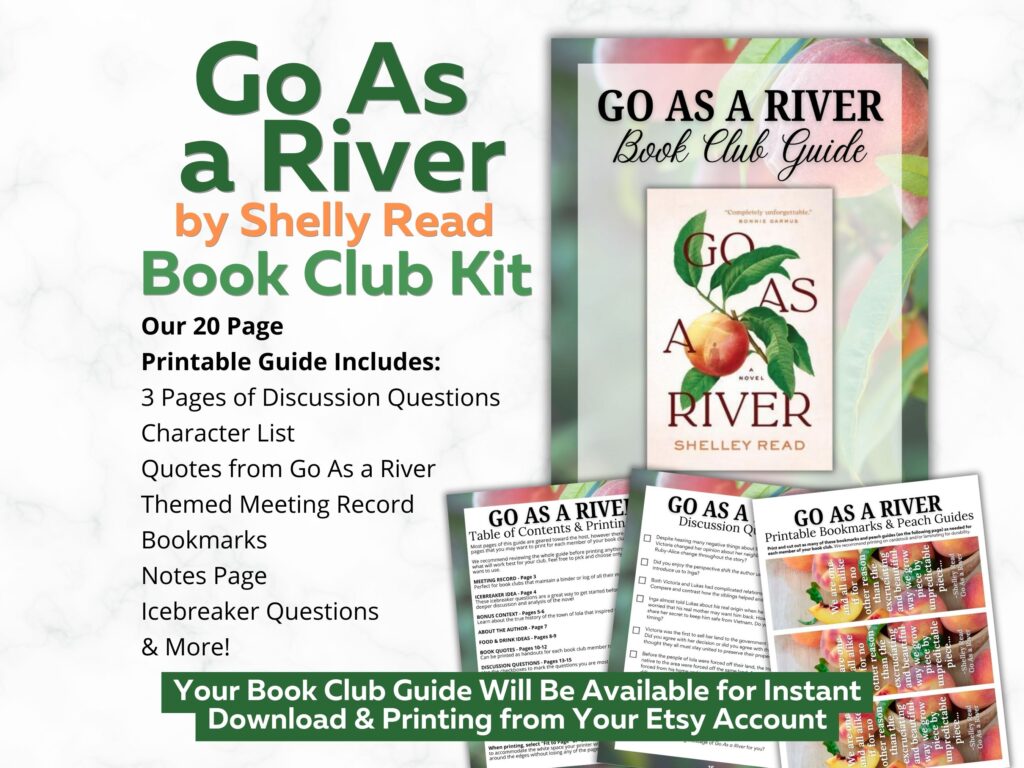
Additional Book Club Resources
- Best Book Club Books for 2026
- Affordable Gifts for Your Book Club Friends
- Best Book Club Books to Read in Winter
- Christmas Books for Book Clubs in December 2025
- Best Fall Book Club Books for 2025
- Best Book Club Books for 2025
- Best Summer Book Club Books
- Best Book Club Books From 2024
- Go As a River Book Club Questions & Guide
- Just for the Summer by Abby Jimenez – Discussion Questions and Book Club Guide
